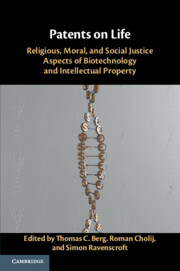 Patents on Life
Patents on Life from III - Social Justice and Political Aspects
Published online by Cambridge University Press: 28 September 2019
This chapter examines the debate over the right and ability of countries to grant compulsory licenses on patented pharmaceutical products, including biologic drugs produced in living organisms, as a means of ensuring access to medicines. Opponents of such measures sometimes label them as “theft.” This chapter contemplates the validity of such theft rhetoric from an unconventional perspective: that of biblical teachings on what it means to steal. After an introduction to the issue, Part II describes the use of theft rhetoric in relation to intellectual property infringement broadly and drug patent compulsory licenses in particular. Part III challenges the contention, suggested by theft rhetoric, that compulsory licenses are morally wrong as a form of stealing, by considering the meaning of theft in the context of its Judeo-Christian origins. Part IV considers the cogency of the accusation that the issuance of compulsory licenses in developing countries destroys pharmaceutical company innovation incentives. Part V concludes that expanding the definition of theft to include, as the Bible does, the possibility that a property owner may be stealing from the poor, can help us to properly evaluate the morality of drug patent compulsory licenses.
To save this book to your Kindle, first ensure no-reply@cambridge.org is added to your Approved Personal Document E-mail List under your Personal Document Settings on the Manage Your Content and Devices page of your Amazon account. Then enter the ‘name’ part of your Kindle email address below. Find out more about saving to your Kindle.
Note you can select to save to either the @free.kindle.com or @kindle.com variations. ‘@free.kindle.com’ emails are free but can only be saved to your device when it is connected to wi-fi. ‘@kindle.com’ emails can be delivered even when you are not connected to wi-fi, but note that service fees apply.
Find out more about the Kindle Personal Document Service.
To save content items to your account, please confirm that you agree to abide by our usage policies. If this is the first time you use this feature, you will be asked to authorise Cambridge Core to connect with your account. Find out more about saving content to Dropbox.
To save content items to your account, please confirm that you agree to abide by our usage policies. If this is the first time you use this feature, you will be asked to authorise Cambridge Core to connect with your account. Find out more about saving content to Google Drive.